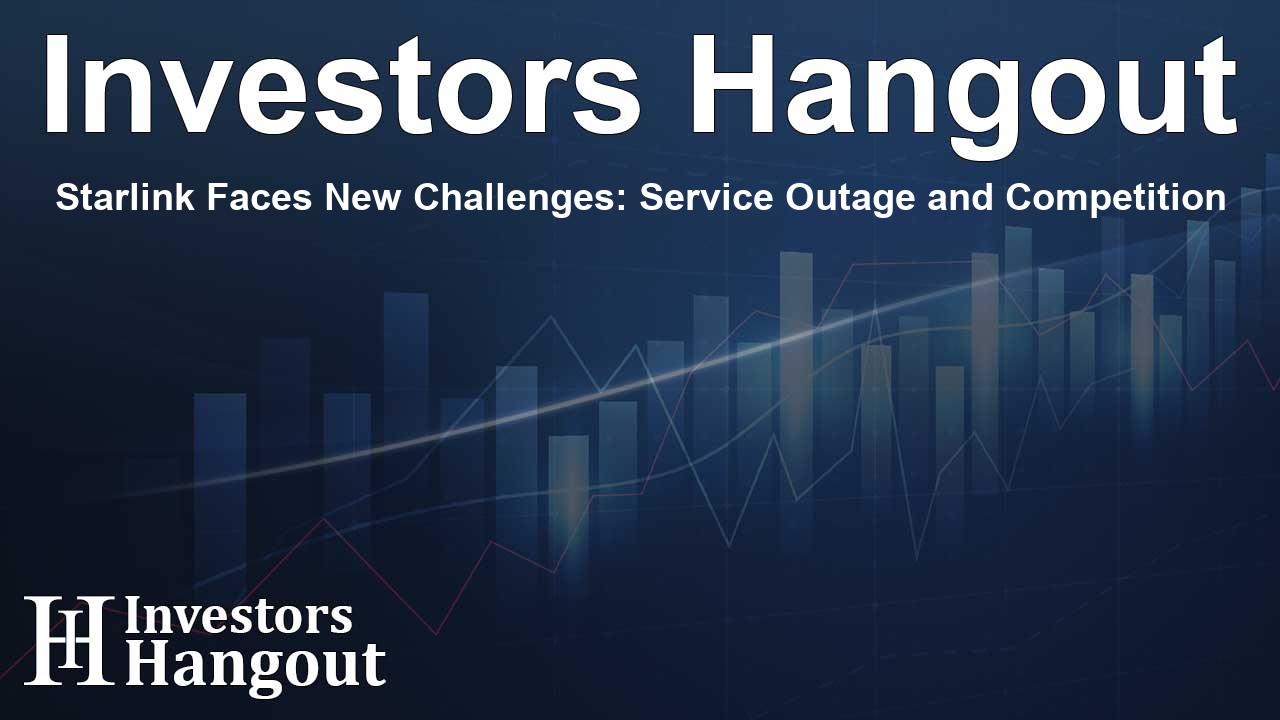Starlink Faces New Challenges: Service Outage and Competition

Starlink Outage
Starlink, the satellite internet provider operated by Elon Musk's SpaceX, has recently encountered a brief service disruption that left many users frustrated. Reports of outages started emerging from various users, highlighting issues tracked on platforms like Downdetector. This incident marks the second outage in a short span of time, indicating potential reliability concerns for the service.
Details of the Outage
Just days ago, Starlink experienced its first outage, which occurred on July 24, around the same time as the launch of T-Mobile US, Inc.’s Starlink-powered direct-to-cell service aimed at connecting users in areas lacking traditional cellular coverage. The outages reflect a challenging period for Starlink as it works to maintain its reputation in the competitive satellite internet market.
The previous outage was attributed to a significant failure in key software systems, as explained by Michael Nicolls, Vice President of Engineering at Starlink. Such issues raise questions about how well the network can manage conflicts during increased demand, especially after recent satellite launches.
Starlink's Recent Developments
Just hours prior to the recent service disruption, SpaceX achieved another successful launch of Starlink satellites from California's Vandenberg Space Force Base. The company aims to significantly increase its launch frequency, planning to double the current rate from 50 to 100 launches annually.
Environmental Concerns
Despite aggressive growth strategies, last week’s proposal for frequent launches faced opposition from the California Coastal Commission, which expressed concerns about the environmental impacts on nearby communities and wildlife. As the satellite industry expands, finding a balance between advancement and ecological stewardship becomes crucial.
Satellite Broadband Competition
In the face of these challenges, competition in the satellite broadband sector is rapidly intensifying. Companies like AST SpaceMobile, Inc. are stepping up their game. AST SpaceMobile has laid out a funded plan to significantly expand its satellite network, intending to launch between 45 and 60 satellites by 2026. The goal of this move is to ensure comprehensive coverage across the United States, Europe, Japan, and other key markets.
AST SpaceMobile's Strategy
CEO Abel Avellan has highlighted the importance of providing continuous service, particularly for U.S. government operations. To meet these ambitious goals, AST SpaceMobile is committed to conducting orbital launches every one to two months over the next few years. Currently, the company has six satellites successfully orbiting, aiming to secure its share of the growing satellite broadband market.
Regulatory Changes Impacting the Industry
Amid these developments, regulatory changes could impact the commercial space sector. An executive order recently signed by President Trump aims to relax environmental restrictions, which Musk and other space industry leaders have claimed stifle progress and innovation in commercial space ventures. Such shifts may pave the way for more aggressive expansions in satellite launches.
Implications for Consumers
As competition accelerates and companies like AST SpaceMobile and T-Mobile enhance their offerings, users may find more diverse internet options in the future. Each provider's ability to ensure service reliability will be crucial for winning consumer trust and commitments in an increasingly crowded marketplace.
Frequently Asked Questions
What caused the recent Starlink outages?
The recent outages were attributed to software failures in the internal systems that manage Starlink's network.
How is the satellite internet market evolving?
The satellite internet market is seeing increased competition, with companies like AST SpaceMobile and T-Mobile offering innovative solutions to expand coverage and services.
What are AST SpaceMobile's plans for the future?
AST SpaceMobile plans to launch between 45 and 60 satellites by 2026, aiming for consistent coverage in various regions globally.
How do regulatory changes affect satellite launches?
Recent executive orders may loosen environmental restrictions, potentially speeding up satellite launch approvals and operations.
What should consumers expect from satellite internet providers?
Consumers can expect more competitive pricing, improved reliability, and wider coverage options as satellite providers strive for market share.
About The Author
Contact Evelyn Baker privately here. Or send an email with ATTN: Evelyn Baker as the subject to contact@investorshangout.com.
About Investors Hangout
Investors Hangout is a leading online stock forum for financial discussion and learning, offering a wide range of free tools and resources. It draws in traders of all levels, who exchange market knowledge, investigate trading tactics, and keep an eye on industry developments in real time. Featuring financial articles, stock message boards, quotes, charts, company profiles, and live news updates. Through cooperative learning and a wealth of informational resources, it helps users from novices creating their first portfolios to experts honing their techniques. Join Investors Hangout today: https://investorshangout.com/
The content of this article is based on factual, publicly available information and does not represent legal, financial, or investment advice. Investors Hangout does not offer financial advice, and the author is not a licensed financial advisor. Consult a qualified advisor before making any financial or investment decisions based on this article. This article should not be considered advice to purchase, sell, or hold any securities or other investments. If any of the material provided here is inaccurate, please contact us for corrections.
